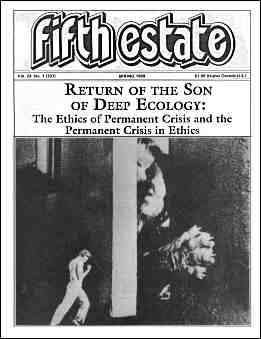Fifth Estate 331, Spring 1989 Add to the Bookbuilder

Fifth Estate Collective
About this issue
The following essay by George Bradford continues the discussion of environmental perspectives begun in these pages in our Fall 1987 edition. Our previous special issue, published at that time, “How Deep Is Deep Ecology? A Challenge to Radical Environmentalism” (also by Bradford), appeared as a major statement coming out of the theoretical work the Fifth Estate has been undertaking since 1979 in examining the character of technology, industrial capitalism and the worsening ecological crisis.
Jan 20, 2018 Read the whole text...
Fifth Estate Collective
Masthead
The Fifth Estate newspaper (ISSN No. 0015–0800) is published quarterly at 4632 Second Ave., Detroit MI 48201 USA. Phone (313) 831–6800. Subscriptions: $5.00 per year; $7.00 per year foreign including Canada. Second Class postage paid at Detroit, Michigan. No copyright. No paid ads. Postmaster: Send address changes to Fifth Estate, P.O. Box 02548, Detroit MI 48202.
Mar 13, 2018 Read the whole text...
Miss Ann Thropy
Deep Ecology as Strategic Knowledge
A Letter to the Fifth Estate
Dear Fifth Estate:
As the author of “Population and AIDS”—the article that seems to have galvanized so much “anarchist” opposition to Earth First!—I can’t help but attempt a brief response to George Bradford’s wide-ranging critique of deep ecology in FE. Although it would be easy enough to get polemical about the rancor in Bradford’s article, polemics are always a side show to the question at hand, which for deep ecology, at least, is the environmental crisis. What I’d like to do, then, is discuss the philosophic project of deep ecology, particularly as it pertains to population. For by misconstruing the former, Bradford misrepresents the latter.
Apr 14, 2018 Read the whole text...
George Bradford (David Watson)
Return of the Son of Deep Ecology
The Ethics of Permanent Crisis and the Permanent Crisis in Ethics
The letter above [“Deep Ecology as Strategic Knowledge,” FE #331, Spring, 1989] was sent to the Fifth Estate last year in response to the essay I wrote, “How Deep Is Deep Ecology? A Challenge to Radical Environmentalism” (FE #327, Fall 1987). I had a brief correspondence with the author (who, interestingly, admitted to being an EF! man), and had planned to print his letter with several others from EF!ers (we eventually printed a selection of them in the Summer 1988 FE). The more I looked at “Miss Ann’s” (rather, Mr. Ann’s) letter, with its claims to an anti-technological, primitivist, even anarchist perspective, the more I realized its appropriateness as a starting point for my essay. However unkind one may judge me for using a relatively short letter as the focus for a long critical essay, I think the letter so representative of the entire range of problems with the deep ecology movement that I think the temptation is one worth following. If the form is strange, I can only hope that the ideas in the essay are important enough to overcome this problem. The form is in part a result of the shorthand manner in which deep ecologists tend to evade a genuinely critical dialogue. Deep ecology (DE) ideology appears to deflect criticism the way religious dogma does, by raising its voice over all others in defense of its intuitions and simply repeating its assertions (hallelujah and amen), as well as by conveniently misrepresenting the views of its critics.
Apr 28, 2018 Read the whole text...
George Bradford (David Watson)
Cheerleaders for the Plague
In his letter, “Miss” Ann Thropy [this issue, FE #331, Spring, 1989] writes that it was his article celebrating AIDS that generated the criticisms of Earth First! and deep ecology. Even though his claim drastically simplifies the reasons for our critiques, it is undeniable that cheerleading epidemics is what earned him his notoriety. If his original AIDS article (“Population and AIDS,” Beltane 1987 EF! Journal) could have been dismissed as a sick joke, the same cannot be said about articles that have since appeared in the EF! Journal with a more developed, ostensibly scientific, argument. One in particular, “Is AIDS the Answer to an Environmentalist’s Prayer?” by Daniel Conner (Yule 1987 EF! Journal) describes the virus as a kind of Gaia’s revenge (Gaia being the name given the concept of a superorganism which is the entire Earth). Since population pressure “lies at the root of every environmental problem we face,” he argues, starting predictably from a Malthusian position, AIDS may be the answer to any “thoughtful” environmentalist’s prayer. If prayer is the key word in this argument, there is a reason; it borders on being pure religion.
Apr 30, 2018 Read the whole text...
George Bradford (David Watson)
The Question of Agriculture
One irony of the deep ecology discussion is that almost at the same time that some deep ecologists were taking an explicit position for the abolition of agriculture as the prime cause of the widening spiral of civilization and ecological destruction, John Zerzan wrote an almost identical thesis in the pages of the Fifth Estate. (See “Agriculture: Essence of Civilization,” FE #329, Summer 1988.) For a response to Zerzan, see Bob Brubaker’s “Comments on Zerzan’s Critique of Agriculture” in FE #330, Winter 1988–89.)
May 1, 2018 Read the whole text...
Fifth Estate Collective
FE Bookstore
The FE Bookstore is located at 4632 Second Ave., just south of W. Forest, in Detroit. We share space with the Fifth Estate Newspaper and may be reached at the same phone number: (313) 831–6800. Visitors are welcome, but our hours vary so please call before dropping in.
HOW TO ORDER BY MAIL:
1) List the title of the book, quantity wanted, and the price of each;
May 1, 2018 Read the whole text...
